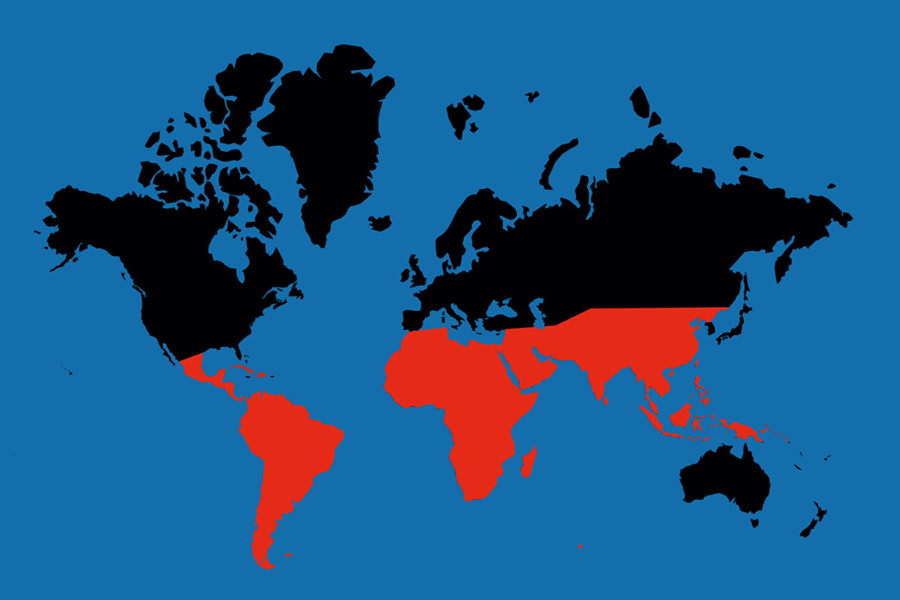
Published :
Updated :

For decades, the global economic order has been shaped largely by the priorities of advanced economies in the West. Institutions like the International Monetary Fund (IMF), the World Bank, and the World Trade Organization (WTO) were designed in an era when Western economic and political dominance was unchallenged. While these bodies have contributed to global stability and growth, their structures and rules now risk sidelining the very countries that increasingly define the future of the global economy: the emerging and developing nations of the Global South.
Today, the South accounts for more than 60 per cent of global gross domestic product or GDP (on a purchasing power parity basis) and represents over 85 per cent of the world’s population. Yet, their voices remain underrepresented in the institutions that set the rules for trade, finance, and development. This imbalance is no longer sustainable—not morally, and certainly not economically.
The financial shocks of recent years—from the COVID-19 pandemic to rising geopolitical tensions and climate crises—have exposed the fragility and inequities of the global system. In this environment, the Global South must not only be heard but must lead in setting a new, more equitable economic agenda.
The Bretton Woods institutions were built for a world where the United States and its Western allies led economic policymaking. While this system worked for decades, it has not evolved in line with new economic realities. Emerging economies like India, Brazil, Indonesia, Nigeria, and South Africa have become engines of global growth. Yet they continue to have limited say in the governance of institutions that influence capital flows, trade policy, and economic cooperation.
Reforming global governance is critical. The IMF’s quota system, which determines voting power, remains skewed toward advanced economies, limiting the influence of the South. The World Bank’s leadership appointments and lending priorities similarly reflect a dated worldview. At the WTO, rules crafted decades ago often constrain the development strategies of low- and middle-income countries.
These governance gaps undermine the legitimacy and effectiveness of global institutions. Addressing them would not only be a matter of fairness—it would foster stronger cooperation and stability. The South’s growing economic weight demands a commensurate role in decision-making.
The South is not waiting passively for reform. Countries across Asia, Africa, and Latin America are innovating in economic policy, development finance, and digital infrastructure. India’s digital identity and payments platforms have revolutionised access to financial services for over a billion people. The African Continental Free Trade Area (ACFTA) promises to reshape intra-African commerce on an unprecedented scale. Brazil’s focus on social protection and environmental sustainability points to development models rooted in equity.
Moreover, Southern-led institutions such as the BRICS New Development Bank (NDB), the Asian Infrastructure Investment Bank (AIIB), and regional financial mechanisms in Latin America and Africa are reshaping the contours of development finance. These bodies reflect Southern priorities of mutual respect, sovereignty, and long-term resilience rather than conditionality and short-term profit.
Such initiatives demonstrate the South’s capacity to not only participate in but also drive the global economic agenda—if granted adequate political space and influence.
If the Global South is to lead the global economic agenda, it must do so with a clear vision, one that prioritises:
• Fair Representation. Reforming international institutions to give emerging economies meaningful voting power and leadership roles.
• Economic Sovereignty. Ensuring countries retain the policy space to pursue inclusive, sustainable growth models tailored to their unique contexts.
• Resilience. Building buffers against shocks through more flexible debt restructuring mechanisms, counter-cyclical financing, and diversified supply chains.
• Sustainability and Climate Justice. Mobilising equitable climate finance, ensuring technology transfers, and addressing loss and damage in vulnerable countries.
• Digital Inclusion and Sovereignty. Democratising access to digital infrastructure, reforming intellectual property rules, and protecting data sovereignty.
These pillars reflect not only the priorities of the South but the imperatives of a global economy increasingly marked by uncertainty and inequality.
There is a strong case for advanced economies to support this shift. An economic order that excludes the majority of the world’s population from decision-making risks systemic instability. Inclusive governance fosters cooperation, sustainable growth, and open markets—benefiting investors and consumers worldwide.
Moreover, many challenges—climate change, pandemics, financial shocks—are transnational and require collective solutions. If the South is sidelined, global cooperation falters. Embracing Southern leadership can reinvigorate multilateralism and advance shared interests.
However, leadership from the South is not without challenges. The Global South is diverse, with varying interests and levels of development. Internal governance issues—corruption, inequality, political instability—must be addressed to build credible and effective leadership.
Coordination across Southern countries and institutions is essential to build a unified front in global negotiations. Strategic diplomacy and visionary leadership will be critical to navigate geopolitical rivalries and avoid replicating old power imbalances.
The global economic landscape is evolving rapidly. The Global South possesses the economic heft, demographic weight, and innovative potential to lead the next phase of global economic governance. This is not just an opportunity for the South—it is an imperative for the entire world.
For global stability, prosperity, and sustainability, the South must be at the helm of the global economic agenda. The time to recognise this reality—and act accordingly—is now.
Manmohan Parkash is a former Senior Advisor, Office of the President, and Deputy Director General, South Asia, Asian Development Bank (ADB). manmohanparkash@gmail.com


 For all latest news, follow The Financial Express Google News channel.
For all latest news, follow The Financial Express Google News channel.